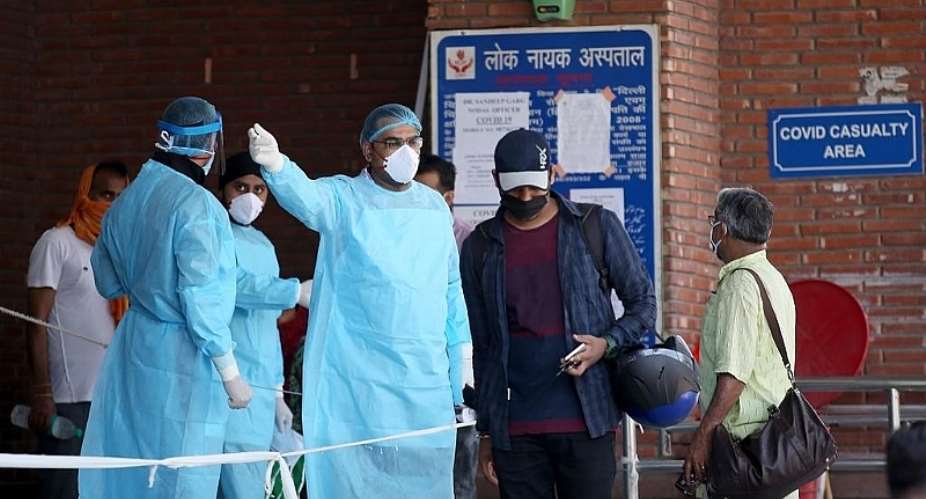As the spread of the coronavirus accelerates across the country, government and private hospitals are finding it difficult to recruit new and additional healthcare workers.
With nearly 50,000 new cases logged daily for over a week, India's COVID-19 tally went over the 1.6 million mark on Friday. India recorded over 100,000 cases in just 48 hours as the country's toll stands at 35,807 and has overtaken Italy to have the fifth-most deaths.
Daily spike in cases
For weeks now, India has reported the fastest growth in COVID-19 infections in the world and scientists warn that the third worst-hit country in the global coronavirus tally after the US and Brazil, and would see it overtake Brazil in the number of daily cases.
What's more the pandemic has added to the stress of an overburdened healthcare workforce as both state and private healthcare facilities find themselves stretched.
“Existing healthcare workers are unwilling to take on COVID-19 work due to poor working conditions in many public and private hospitals including long shifts and delayed and reduced salary payments,” reported 'India Spend', a data-driven website.
“The pandemic has also brought to the fore the differences in salaries and facilities that contracted healthcare workers and their peers employed on a permanent basis are entitled to,” the report said.
Poor facilities and working conditions
India has one medical doctor for every 1,404 people and 1.7 nurses per 1000 people according to the government's figures which is much lower than the WHO benchmark of 1 doctor and 3 nurses for every 1000 people.
It is reported that there has been a reduction in salaries in several private hospitals across India. In some hospitals in north India, medical staff were not paid for almost two months.
Healthcare staff in private hospitals in the southern state of Kerala, for instance, are facing a “forced loss of pay”, since the lockdown because private hospitals have restricted the number of days that staff work so that they are paid for fewer working days.
Some months back, the United Nurses Association, a national union representing 380,000 nurses, filed a petition with India's Supreme Court seeking the government's intervention to frame a policy for their welfare, including regarding non-payment of salaries, lack of personal protective equipment (PPE) in hospitals, long shifts and lack of access to adequate testing and quarantining.
India will have different peaks
In the western state of Maharashtra, which has the highest number of infections, many nurses are also unwilling to work because of the fear of Covid-19, the perception that hospitals do not provide adequate personal protection equipment, poor salaries and lack of job security.
On Friday, the Supreme Court finally directed the government to ensure the salaries of doctors and healthcare workers on the frontlines of the Covid-19 battle were paid on time.h
According to a report by the Center for Disease Dynamics, Economics & Policy (CDDEP), India has shortage of an estimated 600,000 doctors and 2 million nurses. Scientists found that lack of staff who are properly trained in administering antibiotics is preventing patients from accessing live-saving drugs.
Case counts have been spiking across the country as have rates of hospitalisation and deaths in hotspot cities like Mumbai, Chennai, Delhi and Ahmedabad.
A shortage of doctors, healthcare workers, well-equipped beds and lack of faith in state-run hospitals has left many states struggling to cope with the virus.
India's curve has not yet turned the corner and epidemiologists believe the country will witness several coronavirus peaks where every area could have its own peak.
Bhramar Mukherjee, a well known epidemiologist who has been working on mathematical models of the trajectory of COVID-19 in India said the tally of official detected cases will go up to 2 million by August 15 and 3 million by the end of August.
The government announced that it plans to achieve the target of 1 million tests every day in the country within one or two months.





 Prince Harry, Meghan visit Nigeria
Prince Harry, Meghan visit Nigeria
 Ghana’s electoral commission is one that trusts thieves — Omane Boamah
Ghana’s electoral commission is one that trusts thieves — Omane Boamah
 All government cares about is spending more and more money on itself — Dalex Fin...
All government cares about is spending more and more money on itself — Dalex Fin...
 COVID-19: GHS records 57% vaccination coverage
COVID-19: GHS records 57% vaccination coverage
 My government will support churches – Bawumia assures Clergy
My government will support churches – Bawumia assures Clergy
 Mahama, Bawumia and Alan have flatly failed Ghanaians – Kofi Akpaloo
Mahama, Bawumia and Alan have flatly failed Ghanaians – Kofi Akpaloo
 PAC warns public institutions to comply with the Public Procurement Act
PAC warns public institutions to comply with the Public Procurement Act
 Voter registration: NDC slams EC’s refusal to share serial numbers of BVR kits
Voter registration: NDC slams EC’s refusal to share serial numbers of BVR kits
 Akufo-Addo's 'corrupt, yenkyendi cronyism' cost Ghana $190m stake in US Millenni...
Akufo-Addo's 'corrupt, yenkyendi cronyism' cost Ghana $190m stake in US Millenni...
 Don't be 'conduit' to President Akufo-Addo's 'I can't hand over power to Mahama'...
Don't be 'conduit' to President Akufo-Addo's 'I can't hand over power to Mahama'...
